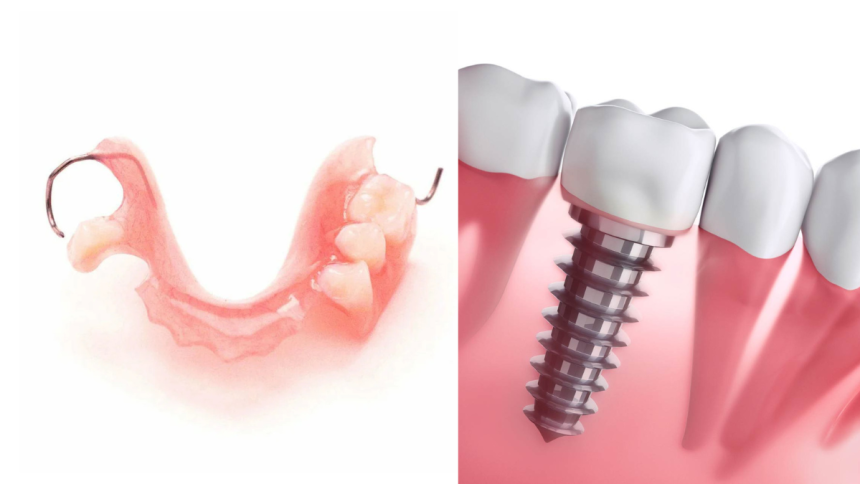If you have one or more missing teeth, dining out with friends, laughing loudly, and chewing your favorite foods might be anxiety-inducing events. Flipper teeth and dental implant treatment are two solutions to replace missing teeth. But they have key differences to be aware of and understand before you commit to either as an option to restore your smile.
What are dental implants?
Dental implant restorations are a long-term solution for missing teeth. During dental implant surgery, your prosthodontist will place a titanium root into your gum, which eventually fuses with the jawbone and provides a stable base for replacement teeth. These replacement teeth attach directly to the implant post. Your dentist may use dental crowns, dental bridges, or full fixed arch implant dentures, depending on how many teeth you need to have replaced.
Because of the longevity of dental implants, the procedure can be costly, and the healing process takes time. However, dental implants can last a lifetime with proper care and maintenance, which justifies the higher cost and longer recovery period for some patients.
What are flipper teeth?
Flipper teeth are a type of removable teeth, similar to partial dentures, that fit into your gums alongside existing teeth and are meant to replace only a few missing teeth. They’re a non-surgical tooth replacement option that might make sense if you’re looking for a money-saving alternative to dental implants.
But it’s important to note that there are some limitations of flipper teeth as they’re only meant to be a short-term solution that may need to be replaced every year or so. Flipper teeth tend to be far less expensive than dental implants, but they’re not customized to your unique smile the way implants are, meaning you might be able to notice the flippers alongside your existing teeth.
Flipper teeth vs. dental implants
There are some key differences between flipper teeth and dental implants:
Invasiveness
Flipper teeth are a completely non-invasive solution, while dental implants require oral surgery. As flippers sit above the gumline and adhere to surrounding teeth, they’re a less stable option than dental implants. Since implants are screwed into the jawbone to create a solid foundation for biting, they work well even on back teeth that take on a heavy bite force.
Natural appearance
The crown, bridge, or denture that caps a dental implant is specially designed to match the shade and shape of existing teeth. Flipper teeth are generally made from acrylic and may not be a great match alongside existing natural teeth.
Longevity
Dental implants are designed to be a long-lasting solution with proper care and maintenance. Flipper teeth may only last for a few years at most before they need to be repaired or replaced.
Comfort and stability
Dental implants don’t move once placed, creating a stable foundation for chewing and speaking. Since flipper teeth are removable, they can be prone to shifting in the mouth and may come out of place. Dental implants are also designed with comfort in mind, feeling most akin to natural teeth, while flippers can feel bulky or out-of-place if not fitted perfectly with existing teeth.
Cost
Since dental implants are a surgical, long-term solution, the cost is higher than that of flipper teeth. The price of dental implant treatment varies depending on how many teeth need to be replaced, the materials used to create the artificial teeth, and the complexity of the treatment plan. Flipper teeth may only cost a few hundred dollars depending on the number of replacement teeth on the flipper and the location of the teeth.
Bone stimulation
Since dental implants are placed directly into the jawbone, they can help stimulate bone growth over time. Flippers that rest on the gumline won’t lessen the risk of bone loss over time.
At home care
Flippers are removable, meaning you can take them out at night to clean and disinfect them. On the other hand, dental implants should be cared for just like your natural teeth, with daily brushing and flossing to promote optimal oral health.
The bottom line
Flipper teeth and dental implants are two different ways to replace missing teeth. Flippers may work well as an affordable, short-term solution. However, dental implant restorations are designed with longevity and comfort in mind. Consult your local dentist to discuss which tooth replacement solutions are the best for you based on your unique oral health needs and budget.
Lynn Martelli is an editor at Readability. She received her MFA in Creative Writing from Antioch University and has worked as an editor for over 10 years. Lynn has edited a wide variety of books, including fiction, non-fiction, memoirs, and more. In her free time, Lynn enjoys reading, writing, and spending time with her family and friends.















